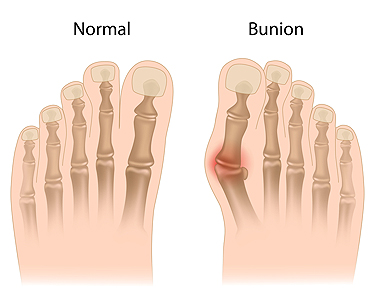Connect With Us
Blog

A bunion, or hallux valgus, is a bony bump that forms at the base of the big toe, often causing the toe to lean inward. This condition can lead to pain, swelling, and difficulty wearing shoes. For mild cases, simple changes like wearing wider shoes and using padding or toe spacers can provide relief. Custom orthotics may also help by reducing pressure on the joint and slowing the bunion’s progression. When symptoms worsen or interfere with daily life, surgery may be considered to correct the alignment and relieve discomfort. Each case is different, and treatment depends on the severity of the bunion, activity level, and how much pain it causes. Waiting and watching may work for some, while others benefit from early support or surgical correction. If you have a bunion that is becoming painful or limiting your mobility, it is suggested that you see a podiatrist.
If you are suffering from bunion pain, contact one of our podiatrists of Houston Foot and Ankle. Our doctors can provide the care you need to keep you pain-free and on your feet.
What Is a Bunion?
Bunions are painful bony bumps that usually develop on the inside of the foot at the joint of the big toe. As the deformity increases over time, it may become painful to walk and wear shoes. Women are more likely to exacerbate existing bunions since they often wear tight, narrow shoes that shift their toes together. Bunion pain can be relieved by wearing wider shoes with enough room for the toes.
Causes
- Genetics – some people inherit feet that are more prone to bunion development
- Inflammatory Conditions - rheumatoid arthritis and polio may cause bunion development
Symptoms
- Redness and inflammation
- Pain and tenderness
- Callus or corns on the bump
- Restricted motion in the big toe
In order to diagnose your bunion, your podiatrist may ask about your medical history, symptoms, and general health. Your doctor might also order an x-ray to take a closer look at your feet. Nonsurgical treatment options include orthotics, padding, icing, changes in footwear, and medication. If nonsurgical treatments don’t alleviate your bunion pain, surgery may be necessary.
If you have any questions, please feel free to contact our offices located in Kingwood, Humble, The Woodlands, and Conroe, TX . We offer the newest diagnostic and treatment technologies for all your foot care needs.

Heel pain can stem from various conditions, including plantar fasciitis, Achilles tendonitis, or a stress fracture. Plantar fasciitis occurs when the thick band of tissue along the bottom of the foot becomes inflamed, often causing sharp pain in the heel, particularly with the first steps in the morning. Achilles tendonitis involves irritation of the tendon that connects the calf muscle to the heel, leading to pain, swelling, and stiffness, especially after physical activity. A stress fracture, often caused by repetitive stress or overuse, can result in a small crack in the heel bone, causing localized pain and swelling. Symptoms of these conditions include pain, tenderness, and swelling in the heel area, making walking or standing uncomfortable. A podiatrist can accurately diagnose the source of the pain through a physical exam, imaging tests, and by discussing symptoms. Treatment may include rest, custom orthotics, targeted exercises, or, in severe cases, surgery. If you have heel pain, it is suggested that you schedule an appointment with a podiatrist for appropriate care.
Many people suffer from bouts of heel pain. For more information, contact one of our podiatrists of Houston Foot and Ankle. Our doctors can provide the care you need to keep you pain-free and on your feet.
Causes of Heel Pain
Heel pain is often associated with plantar fasciitis. The plantar fascia is a band of tissues that extends along the bottom of the foot. A rip or tear in this ligament can cause inflammation of the tissue.
Achilles tendonitis is another cause of heel pain. Inflammation of the Achilles tendon will cause pain from fractures and muscle tearing. Lack of flexibility is also another symptom.
Heel spurs are another cause of pain. When the tissues of the plantar fascia undergo a great deal of stress, it can lead to ligament separation from the heel bone, causing heel spurs.
Why Might Heel Pain Occur?
- Wearing ill-fitting shoes
- Wearing non-supportive shoes
- Weight change
- Excessive running
Treatments
Heel pain should be treated as soon as possible for immediate results. Keeping your feet in a stress-free environment will help. If you suffer from Achilles tendonitis or plantar fasciitis, applying ice will reduce the swelling. Stretching before an exercise like running will help the muscles. Using all these tips will help make heel pain a condition of the past.
If you have any questions please contact our offices located in Kingwood, Humble, The Woodlands, and Conroe, TX . We offer the newest diagnostic and treatment technologies for all your foot and ankle needs.

Experiencing sudden foot pain while walking can be alarming and may result from several conditions. Plantar fasciitis is a common cause, involving inflammation of the tissue that supports the arch, leading to sharp pain in the heel or sole. Calluses, which develop from friction and pressure, can create discomfort with each step. Metatarsalgia, a condition affecting the ball of the foot, causes aching or burning pain due to excessive stress on the metatarsal bones. Morton's neuroma, a thickening of tissue around a nerve between the toes, can result in a sharp, tingling sensation. Wearing supportive footwear, using cushioned insoles, and avoiding excessive pressure can help manage symptoms. If you have persistent or worsening pain, it is suggested that you visit a podiatrist who can determine what the cause is, and offer appropriate treatment solutions.
Foot Pain
Foot pain can be extremely painful and debilitating. If you have a foot pain, consult with one of our podiatrists from Houston Foot and Ankle. Our doctors will assess your condition and provide you with quality foot and ankle treatment.
Causes
Foot pain is a very broad condition that could be caused by one or more ailments. The most common include:
- Bunions
- Hammertoes
- Plantar Fasciitis
- Bone Spurs
- Corns
- Tarsal Tunnel Syndrome
- Ingrown Toenails
- Arthritis (such as Gout, Rheumatoid, and Osteoarthritis)
- Flat Feet
- Injury (from stress fractures, broken toe, foot, ankle, Achilles tendon ruptures, and sprains)
- And more
Diagnosis
To figure out the cause of foot pain, podiatrists utilize several different methods. This can range from simple visual inspections and sensation tests to X-rays and MRI scans. Prior medical history, family medical history, and any recent physical traumatic events will all be taken into consideration for a proper diagnosis.
Treatment
Treatment depends upon the cause of the foot pain. Whether it is resting, staying off the foot, or having surgery; podiatrists have a number of treatment options available for foot pain.
If you have any questions, please feel free to contact our offices located in Kingwood, Humble, The Woodlands, and Conroe, TX . We offer the newest diagnostic and treatment technologies for all your foot care needs.

Foot and ankle injuries are frequent in athletes, whether from high-impact sports like basketball or repetitive activities such as running. Sprains, fractures, tendonitis, and overuse injuries can sideline even the most dedicated athletes, if not properly managed. Effective treatment begins with an accurate diagnosis. A detailed assessment of how the injury occurred, along with a physical exam and imaging when necessary, helps identify the extent of the damage. Early intervention is key. Rest, compression, and elevation are often the first steps taken to reduce pain and swelling. Supportive devices, such as braces or orthotics, may be recommended to protect the injured area and prevent further damage. Target exercises focus on restoring strength, flexibility, and balance to the foot and ankle. A gradual return to sport is important to avoid setbacks. To prevent future injuries, athletes may need to adjust footwear, training routines, or technique. If you have an active lifestyle and have incurred a foot or ankle injury, it is suggested that you schedule an appointment with a podiatrist for a comprehensive evaluation and personalized treatment plan.
Ankle and foot injuries are common among athletes and in many sports. They can be caused by several problems and may be potentially serious. If you are feeling pain or think you were injured in a sporting event or when exercising, consult with one of our podiatrists from Houston Foot and Ankle. Our doctors will assess your condition and provide you with quality foot and ankle treatment.
Common Injuries
The most common injuries that occur in sporting activities include:
- Achilles Tendonitis
- Achilles Tendon Rupture
- Ankle Sprains
- Broken Foot
- Plantar Fasciitis
- Stress Fractures
- Turf Toe
Symptoms
Symptoms vary depending upon the injury and in some cases, there may be no symptoms at all. However, in most cases, some form of symptom is experienced. Pain, aching, burning, bruising, tenderness, tightness or stiffness, sensation loss, difficulty moving, and swelling are the most common symptoms.
Treatment
Just as symptoms vary depending upon the injury, so do treatment options. A common treatment method is known as the RICE method. This method involves rest, applying ice, compression and elevating the afflicted foot or ankle. If the injury appears to be more serious, surgery might be required, such as arthroscopic or reconstructive surgery. Lastly, rehabilitation or therapy might be needed to gain full functionality in the afflicted area. Any discomfort experienced by an athlete must be evaluated by a licensed, reputable medical professional.
If you have any questions, please feel free to contact our offices located in Kingwood, Humble, The Woodlands, and Conroe, TX . We offer the newest diagnostic and treatment technologies for all your foot care needs.
